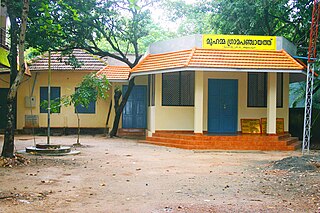
The National Human Rights Commission of India is a statutory body constituted on 12 October 1993 under the Protection of Human Rights Ordinance of 28 September 1993. It was given a statutory basis by the Protection of Human Rights Act, 1993 (PHRA). The NHRC is responsible for the protection and promotion of human rights, defined by the act as "Rights Relating To Life, liberty, equality and dignity of the individual guaranteed by the constitution or embodied in the international covenants and enforceable by courts in India".

The Scheduled Castes and Scheduled Tribes are officially designated groups of people and among the most disadvantaged socio-economic groups in India. The terms are recognized in the Constitution of India and the groups are designated in one or other of the categories. For much of the period of British rule in the Indian subcontinent, they were known as the Depressed Classes.

The Fundamental Rights, Directive Principles of State Policy and Fundamental Duties' are sections of the Constitution of India that prescribe the fundamental obligations of the states to its citizens and the duties and the rights of the citizens to the State. These sections are considered vital elements of the constitution, which was developed between 1949 by the Constituent Assembly of India.
Reservation is a system of affirmative action in India created during the British rule. It provides historically disadvantaged groups representation in education, employment, government schemes, scholarships and politics. Based on provisions in the Indian Constitution, it allows the Union Government and the States and Territories of India to set reserved quotas or seats, at particular percentage in Education Admissions, Employments, Political Bodies, Promotions, etc., for "socially and educationally backward citizens."

Panchayati raj is the system of local self-government of villages in rural India as opposed to urban and suburban municipalities.
The Directive Principles of State Policy of India are the guidelines to be followed by the government of India for the governance of the country. They are not enforceable by any court, but the principles laid down there are considered 'Fundamental' in the governance of the country, which makes it the duty of the State to apply these principles in making laws to establish a just society in the country. The principles have been inspired by the Directive Principles given in the Constitution of Ireland which are related to socialjustice, economic welfare, foreign policy, and legal and administrative matters.
The Scheduled Castes and the Scheduled Tribes Act, 1989 was enacted by the Parliament of India to prevent atrocities and hate crimes against the scheduled castes and scheduled tribes. The Act is popularly known as the SC/ST Act, PoA, or simply the 'Atrocities Act'.

Constitution of Nepal 2015 is the present governing Constitution of Nepal. Nepal is governed according to the Constitution which came into effect on 20 September 2015, replacing the Interim Constitution of 2007. The constitution of Nepal is divided into 35 parts, 308 Articles and 9 Schedules.

The Ministry of Tribal Affairs (MOTA) is an Indian Government ministry charged with overall development of Scheduled Tribe communities of India by providing them education, scholarships, grants to create more health infrastructure in tribal communities, preservation of Tribal Culture & languages and direct cash transfer schemes to economically backward tribal families.

The National Tiger Conservation Authority (NTCA) was established in India in December 2005, following a recommendation of the Tiger Task Force. The Prime Minister of India established it to reorganise the management of Project Tiger and many Tiger Reserves in India.
The National Commission for Protection of Child Rights (NCPCR) is an Indian statutory body established by an Act of Parliament, the Commission for Protection of Child Rights (CPCR) Act, 2005. The Commission works under the aegis of Ministry of Women and Child Development, GoI. The Commission became operational on 5 March 2007.
The National Commission for Backward Classes is an Indian constitutional body under the jurisdiction of Ministry of Social Justice and Empowerment, Government of India established through Constitution Act, 2018 this amendment act in the constitution to make it a constitutional body under Article 338B of the Indian Constitution. It was constituted pursuant to the provisions of the National Commission for Backward Classes Act, 1993.
The National Commission for Scheduled Castes is an Indian constitutional body under the jurisdiction of Ministry of Social Justice and Empowerment, Government of India established with a view to provide safeguards against the exploitation of Scheduled Castes and Anglo Indian communities to promote and protect their social, educational, economic and cultural interests, special provisions were made in the Constitution. Article 338 of the Indian constitution deals with National Commission for Scheduled Castes. Article 338 A deals with National Commission for Scheduled tribes.

The Provisions of the Panchayats Act, 1996 abbreviated as PESA Act is a law enacted by the Government of India for ensuring self governance through traditional Gram Sabhas for people living in the Scheduled Areas of India. Scheduled Areas are areas identified by the Fifth Schedule of the Constitution of India. Scheduled Areas are found in ten states of India which have predominant population of tribal communities. The Scheduled Areas, were not covered by the 73rd Constitutional Amendment or Panchayati Raj Act of the Indian Constitution as provided in the Part IX of the Constitution. PESA was enacted on 24 December 1996 to extend the provisions of Part IX of the Constitution to Scheduled Areas, with certain exceptions and modifications. PESA sought to enable the Panchayats at appropriate levels and Gram Sabhas to implement a system of self-governance with respect to a number of issues such as customary resources, minor forest produce, minor minerals, minor water bodies, selection of beneficiaries, sanction of projects, and control over local institutions. PESA is an Act to provide for the extension of the provisions of Part IX of the Constitution relating to the Panchayats and the Scheduled Areas. PESA was viewed as a positive development for tribal communities in Scheduled Areas who had earlier suffered tremendously from engagement with modern development processes and from the operation of both colonial laws and statutes made in independent India. The loss of access to forest, land, and other community resources had increased their vulnerability. Rampant land acquisition and displacement due to development projects had led to large scale distress in tribal communities living in Scheduled Areas. PESA was seen as a panacea for many of these vulnerabilities and sought to introduce a new paradigm of development where the tribal communities in such Scheduled Areas were to decide by themselves the pace and priorities of their development.
The Delhi Commission for Women (DCW) is a statutory body of the Government of Delhi constituted to investigate and examine all matters relating to the safety and security of women under the constitution and other laws in Delhi, India.
The Kerala Women's Commission is a statutory body constituted under Section 5 of The Kerala Women's Commission Act, 1990. According to the Act, the commission was constituted to improve the status of women in the State of Kerala and to inquire into unfair practices affecting women and for the matters connected therewith or incidental thereto.
Andhra Pradesh State Commission for Women is a statutory body constituted in the year 1993 to deal with the issues relating to crime against women in the state of Andhra Pradesh. The commission for welfare of women in the state was set up by Andhra Pradesh Government as a quasi-judicial body.
Punjab State Commission for Women is a statutory body constituted in the year 1993 to deal with the issues relating to crime against women in the state of Punjab. The commission for the welfare of women in the state was set up by Punjab Government as a quasi-judicial body.
Uttarakhand State Commission for Women is a statutory body constituted in the year 1993 to deal with the issues relating to crime against women in the state of Uttarakhand. The commission for welfare of women in the state was set up by Uttarakhand Government as a quasi-judicial body.

Punjab Assembly Committee on Welfare of Scheduled Castes, Scheduled Tribes and Backward Classes of Punjab Legislative Assembly is constituted annually for a one-year period from among the members of the Assembly. The committee focuses on the Scheduled Castes and Scheduled Tribes and Other Backward Class of Punjab population.










